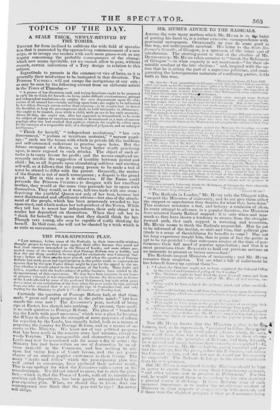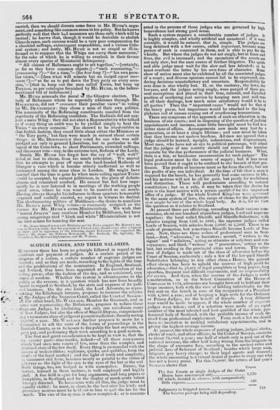MR. HUMES ADVICE TO THE RADICALS.
AMONG the very many matters which Mr. Hume is in tie habit of putting his hand to, is a rather extensive correspondence with provincial newspapers. Occasionally he may do some good in this way, not unfrcquently mischief. Ilk letter to the Scots Re- former's Gazette, of Glasgow, is a specimen of the latter sort of interference. The starting-point is that of the electioo of Mr. DENNISTOUN : Mr.ffirstE takes occasion to "thank the Reformers of Glasgow "—in what capacity is not mentioned—" for their ad- mirable conduct at the late election ; " amid, inspired with the no- tion that he is acting the part of a sagacious politician, and amal- gamating the heterogeneous materials of conflicting parties, holds forth in this wise.
"Bryan:done Spare, 24 June L437. "Nit dear Sir—Your proceedings in Glasgow on the :26t II alt, inlet. had an excellent effect, at),I made up for the disgrace we have suffered in Westminster : and I hope. in the contest we have to maintain against the Tories awl the Clergy—the sum. irter, of bail government, and of every kind of ;duke—that Reformers In every constituency will follow the exatnple of the Glasge. Reformers.
" I rtre aware of the great dissatisfaction which exists amongst many Radical Reformers at the conduct of Lord NIelbourtie's Administration : and, in some very im- portant points, there is too mod, eause Ii,, that discontent. BILL at the sante time,
our hopes of ,ileeeSS against the 'Tories rest 011 the co' •ill classes of I teformers and t hey ought, therefore, to act together, each renouncing for a time his own pecan:it views, so is to pat flown the To, y party oil ever.. occasion. " The example of deli•et ion from the Nritigs 011 the Chureh.rato Bill must not be lost sight of by t he more ardent and more lune:Ismaili de It:Ole:11s ; and they must make allowance for the dillerent views of those who form the NI inisierial majority, and Out heap indi■crimilket: bl3t1IC on the Ministers for not going fernier and faster 111:111 they are going.
" I have tny grounds of just complaint against the Miiikiers for ile;:orting, on many occasions, their own princip'e-:, :tint the itopitlar 0 Inch they proinisea to follOW ; but I should inili,harge tot lii y to the people if this oiled Empire, if I opposed them, so ;Ls to risk their coati:tit:owe in "thee. I admit that the %i liters might not to have tupported the Colonial Office in the wicked and tyranuical policy of the Canada,. The ministers ought to have freed the press from all tax. :old from all resit idiot.), which the odious hill of !lir. It ice, of last sr.ssion, has imisised they Wight to haVe re- thiced the military and naval, and otItifr iktablislunents, and taken off those 'axe, most heavy upon the industry of the tstantry, which are in tintaiucil ',arty to keep Up t110,e 1111neee,:lry eXlionses: they might to hare ei1:11111001 their 0, U Itetorin elven to the peolae the power of exercisingI liii suffrage honestly agritist tie j vs did and corrupt Tort party : they ought to ii., ito... these ami malty more thin..;, uhirlt they eftstft /tare done, if they bad not heen either too timi I or unwilling to :obi to the popular power hy such reforms. The It iii, iii ii Linthou tracts et I he Ministers of in- sincerity ; and ii,, not give them either the sit:pieta or the approbat oil I het deserve for what they intve done, and by their emitted rather aid the Tories to the i•fforts they are making to drive the Whigs from the Government. I ain couvineed that tin. hest interests of this country, awl partieularly tit Ireland at this time, dematel the con- tinuance in power of the in esent Ministers, to enable them to cany through their admirable measure of Church-rates abolition, and reforms now in progress in Parliament.
"Gil these grounds, I sincerely thank tho Reformers fir Glasgow for their admirable conduct at the late election. and remain, " Yours s:threrelt , " P. Mackenzie, Esq., Glasgow." "Josidill II ['Me."
" The Radicals in London," Mr. IIrmn tells the Glasgow folks,
" suspect the Alinisters of insincerity, and do not give them either the support or approbation they deserve for what they have done.' This sentence misstates a fact, and betrays a confusion of ideas. In every attempt to advance in a popular direction, the Ministers have received hearty Radical support : it is only when and inas- much as they have shown a tendency to swerve from the straight- forward path, that such support is wavering and uncertain. Mr. HUME seems to think the Radicals ungrateful. Has lie yet to be informed of the maxim, so stale and true, that political gra- titude is a sense of thankfulness for benefits to come ? Ilas riot his long experience taught him, that in point of fact the public is apt to be too grateful ?—that statesmen receive at the time of per- formance their full meed of popular approbation ; and that it is most pernicious (teste Bunntar) to hold out previous services as an immunity to present or future misconduct?
The Radicals suspect Ministers of insincerity ; and Mr. Ilusts censures their suspicion. Yet see what a bill of indictment he has himself drawn up against them !-
1. " I admit the 7.1inisters ought not to have ippart,-.41 the Colonial Office in the wieleed and tgranniml policy of the tc,orrilasi,"
2. "'Ube Ministers ought to have freed the pris.s from all taxes, and front all rcsrl ietions which the ofliou r hill of Mr. Hier, of hut m.sNion, uj- jmmscul.' 3. " They ought to have rolueed the itiliithry. naval, and other cstablisi- Ingots."
4. " They °tight to have t ilium off those taxes most heavy upon the inflostry
of the country, which arc norintit;fled .solchi those a..neeessary 3. etpenses." " They ouLlit to have compirtil th.ar t,., 1 11 f tr,r) MIL"
ti. " They ought to have given to the pc.iple the ;never if excl rising their suffrage hi itit:•tie against the powerfill and e01 ruin TO1 y party."
carried, then we should discern some force in Mr. HUME'S argu- ment, and something like common sense in his policy. But he knows perfectly well that their bad measures are those only which will be carried ; he knows that, though it would be desirable to abolish Church-rates, such success would be a very poor compensation for a shackled suffrage, extravagant expenditure, and a vicious Colo- nial system ; and lastly, Mr. Huarz is not so stupid or ill-in- formed as to suppose that the Whigs can carry those measures,* for the sake of which he is willing to overlook in their favour almost every species of Ministerial delinquency. " All classes of Reformers ought to act together,"—[certainly, so far as they have common objects ;]—" each renouncing,"— [renouncing ?]—" for a time,"—[for how long P]—" his own pecu- liar views,"—[then what will remain but an insipid caput mor- tuum ?]—" so far as to put down the Tory party on every occa- sion,"—[that is, keep out the men called Tories, but keep up Toryism, as per catalogue furnished by Mr. HUME, in the before- mentioned bill of indictment.] Mr. HUME misreads the moral the Glasgow election. The body of Reformers whom he especially addresses through Mr. MACKENZIE, did not "renounce their peculiar views" in voting for Mr. DENNISTOUN : they chose a man of their own politics. The unanimity of the Reforming constituents resulted from the popularity of the Reforming candidate. The Radicals did not sup- port a mere Whig : they did not elect a Representative who talked as if every thing on earth was to be yielded simply to beat the Tories " on every occasion." Too shrewd to be word-ridden in that foolish fashion, they cared little about either the Ministers or the Tory party," but they were much in earnest about certain things: in Mr. DENNISTOUN they voted for one who was self. pledged not only to general Liberalism, but in particular to the repeal of the Corn-laws, to short Parliaments, extended suffrage, and the secret vote—nay, to the extreme test, Reform of the Lords.
Surely Mr. HUME has forgot how the cry of "wolf, wolf!" 4biled at last to alarm, from too much reiteration. We marvel that he attempts to pass off upon the bard-headed Radicals of Glasgow a ruse which is become utterly ineffectual as well as 'hackneyed among the same class in London. He might have iearneel that the time is gone by when mere railing against Tories would be accepted, by earnest politicians, in the place of definite objects and consistent conduct. He cannot but feel how impa- tiently he is now listened to in meetings of the working people ...bout town, where he was wont to be received as art oracle. Having always thought his influence in those quarters honourably equired and usefully exerted, we regret to witness its decline. The electioneering politics of Middlesex—the desire to conciliate Mr. BVNG'S mere Whig voters—is commonly assigned as the excuse for Mr. HUME'S extra-Ministerialism. We wish that .` honest Josteit " may continue Member for Middlesex, but have strong misgivings that " black and white" Ministerialism is not th.e best course for insuring the seat.
• sit. Hume himselr voted with Ministers and the TGrics AGAINST Mr. Harvey's mo t.on ou Monday night, that the payment of Churelt.rates should cease after a time to • dried ; and in opposition to the following stanch Reformers who supported Mr. ilarit.V-- Mr. Grote, Sir William Molesworth, Mr. Roebuck, Mr. Aglionby, Mr. • tIole-lield, Mr. Howard Elphinstone, and Mr. Wallace.



























 Previous page
Previous page